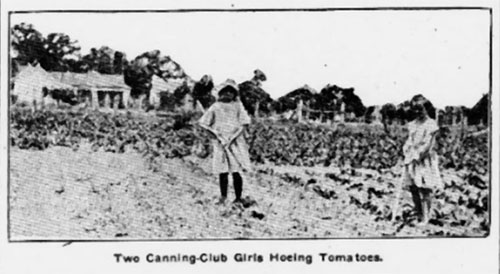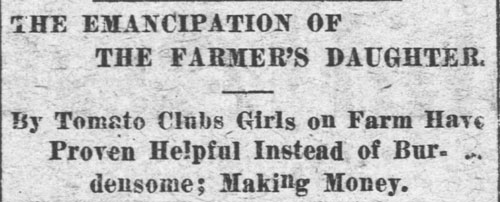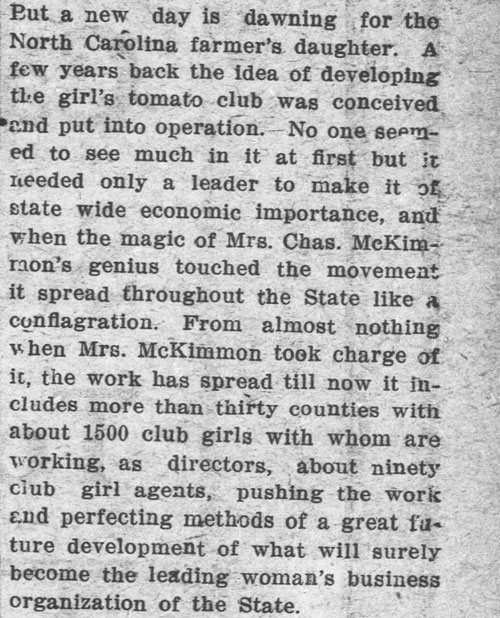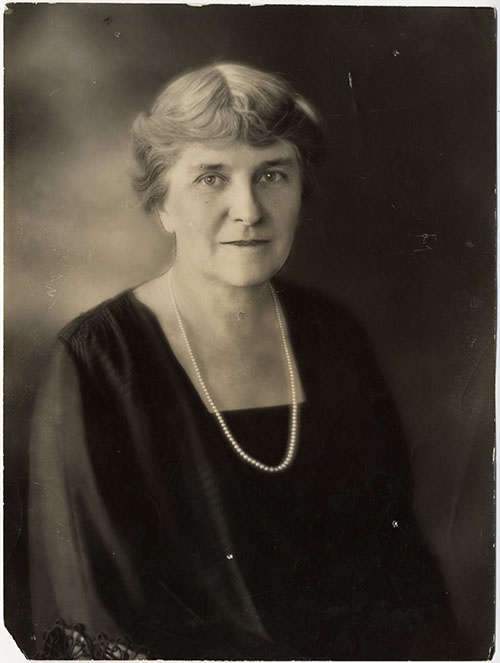
With this past weekend’s freeze, North Carolina’s tomato growing season has come to a close. In the early 20th century, you could still enjoy local tomatoes long into the fall and winter months thanks to the work of tomato club girls.
Marie Samuella Cromer founded the first tomato club in South Carolina in 1910 after attending a program of the South Carolina School Improvement Association. O.B. Martin, an agent with the Department of Agriculture in charge of boys’ corn clubs, outlined a plan in which girls would grow and can tomatoes. Seeing the success boys had experienced in growing and selling corn in corn clubs, Ms. Cromer took the charge, and organized 46 girls in her community into a tomato club. She and five other pioneering Southern women, including Jane S. McKimmon of North Carolina, worked to sprout tomato clubs throughout the southeast through their work as home demonstration agents. Girls aged 10 – 20 learned how to plant, harvest, can, market and sell their tomato crops. On plots sized one-tenth of an acre, girls grew and then canned tomatoes by the hundreds of pounds. The money they earned, McKimmon emphasized, was to be spent as they saw fit. Young girls previously entirely financially dependent on their families found themselves with pocket money and sometimes substantially more. The movement peaked from 1911 through the end of World War I.

In 1914, a young girl named Ina Colclough won first prize in the Durham County girls’ tomato club contest for making $137.00 profit from her own one-tenth of an acre. This was at a time when $15.00 could buy a man’s suit and Stetson hat, $5.00 a lady’s coat and $4.00 a pair of Knox shoes. Newspapers nationwide reported on the success of the movement. An article in the New-York Tribune describes young girls plowing with horses, harrowing without them, and working in every way necessary to grow their tomatoes.
The state fair of 1915 featured an exhibition of the tomato club girls’ work, a description of which can be found here.
McKimmon began her career in 1909 with the Farmer’s Institutes, where she served as a lecturer and also director of its women’s activities. In this work she traveled throughout the state teaching women and girls cooking, baking, sewing and other homemaking skills. In 1911, she accepted the position of North Carolina’s State Home Demonstration Agent, and began planning and organizing the work of the state’s farm girls. Here tireless efforts and enthusiasm for the work of the tomato clubs resulted in thirty-two counties participating by 1914 with 1,500 members, 259,091 cans and $35,631.50 worth of canned tomatoes. McKimmon went on to have a thirty-two year career in home demonstration.

During World War I, McKimmon played a significant role in directing North Carolina’s food conservation efforts. Girls used the skills they learned in the clubs to make their own contributions to the cause. The work of the girls’ tomato clubs, as well as the boys’ corn clubs, was eventually absorbed into the broader work of North Carolina’s 4-H clubs.

Visit North Carolina State University Libraries’ online exhibit Green ‘N’ Growing to learn more about the history of home demonstration and 4-H development and to view girls’ handwritten and illustrated reports on their tomato growing, canning and marketing activities.
